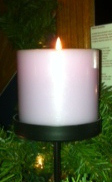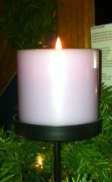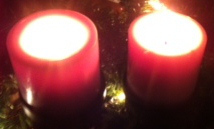Penny J. Johnson's Blog, page 137
December 9, 2012
Advent 2012: Peace
Luke 1:39-45: Mary tells Elizabeth her news.
Poetic Reading: “Peace”
Family Reading: Bartholomew’s Passage –Week Two: Sunday


Daily Prompt: Childhood Revisited
What is your earliest memory? Describe it in detail, and tell us why you think that experience was the one to stick with you.
The first memory that pricked my two-year-old brain happened on a warm summer evening at the summer camp where my father was athletics director. I stood outside our cabin with my little sister and our friends. Bugs swarmed around my head.
“Swat at them,” said my friend.
Searing pain sent my index finger throbbing while I stared at something the size of a needle with a yellow tuft on its end. My mother gently removed the bee stinger with a tweezers, rinsed my finger, and abated the pain with a kiss.
The next day I walked out the cabin door, heading to the dining hall. I screamed. Shocked still, I watched my father run toward me from the dining hall. Another stinger stuck out from my heel. After being soothed once again, I ate dinner tucked in the crook of my father’s arm while he discussed with the other men how to combat this army of bees.
That night my sister and I watched from the window as my father stood guard over the burning railroad tie in front of our cabin. The next morning, I surveyed the charred remains of the hive and bee carnage. Then I walked confidently to chapel in my white sandals.
Like the stings that inspired them, these memories stick in my brain. I learned to be wary of advice, even from a friend. I discovered pain happens to the innocent. But, I cherish my mother’s soothing kiss on my finger, my father running to my rescue, and the protective nightlight of the railroad tie burning.


December 8, 2012
Advent 2012: What is Hope (Part 3)
Today we reflect on the meaning of hope.
Luke 1:46-56: Mary’s Song.
Poetic Reading: Reread all “Hope” Poems
Family Reading: Bartholomew’s Passage –Week One: Saturday
I posed the question to my family, “What is hope?” My ten-year-old eagerly raised his hand and said, “If I say, ‘I hope I have a good day,’ I mean ‘I wish I have a good day.’”
That was the way I hoped he would respond.
Our English definition of “hope” is “the belief or expectation that something wished for can or will happen.” It goes on to state “a virtuous desire for future good” with 1 Corinthians 13:13 as the Christian meaning for “hope.”
But, our English definition of “hope” is not quite biblical. As my ten-year-old did, we interchange the words “hope” and “wish.” Yet, those words are defined very differently in the Hebrew and Greek.
Before I go further, I should state I am not a Hebrew or Greek expert. I simply used my copy of The Strongest NASB Exhaustive Concordance and did a word study of “hope” and “wish.” I discovered the Hebrew language of the Old Testament uses several words for “hope” and “wish.” The Greek language of the New Testament consolidates the words into two to four. I wrote down each numeric reference and wrote down the definitions with a few biblical references for each.
Most of the Hebraic words for “hope” include the word “expectation” as part of the definition. The Greek words includes the word “trust” along with “expectation.” Therefore, the first part of our English definition is true. “Hope is the belief or expectation.” But, here the similarities end.
The words for “wish” in Hebrew and in Greek are defined not by expectation but by intention. One of the Hebrew words, “nephesh,” means “a soul, living being, life, self, person, desire, passion, appetite, emotion.” As a family, we agreed this particular word sounds selfish. The Greek words used in the New Testament focus on “desire,” “will,” ” intent,” even “unattainable wish.” Unlike a hope with the anticipation of an expected outcome, a wish is bent on a desire that may or may not be fulfilled.
My husband wisely directed us to 1 Peter 3:15a (NIV)–”But in your hearts revere Christ as Lord. Always be prepared to give an answer to everyone who asks you to give the reason for the hope that you have.” Knowing my son would answer as I hoped or expected, my wish or desire is that he and his brothers will see beyond our misuse of these words, especially in relation to scripture. With full prayerful intention, I do expect our lesson on the words “hope” and “wish” will result, not in futility, but in greater trust in the Reason for our hope.


December 7, 2012
Daily Prompt: Hobson’s Choice
If you had to choose between being able to write a blog (but not read others’) and being able to read others’ blogs (but not write your own), which would you pick? Why?
My initial reaction is WRITE! Yet, this prompt was posted a few days ago, and I have yet to WRITE about it. I have been READING posts, so in all honesty, I must answer READ for this question. Even so, I am reminded of my first college books by Donald Murray Read to Write and Write to Learn. These primers confirmed how reading and writing collaborate in the creative process. Reading is essential to improve writing. But, it is important not to ignore the writing with all the reading. Reading blogs does inspire me to write my own, but I need to make sure I get my thoughts on the screen as well. I do enjoy the inclusion of both in my daily life and am thrilled I do not have to choose between the two.


Advent 2012: What Is Hope? (Part 2)
Today we reflect on hope in the impossible made possible.
Luke 1:5-25: Zechariah and Elizabeth find out they will be parents in their old age.
Poetic Reading: Reread “While Bethlehem Sleeps” (a priest…); read “The Commander and the Prophet”
Family Reading: Bartholomew’s Passage –Week One: Friday


December 6, 2012
Advent 2012: What is Hope?
Today we reflect on hope in the impossible made possible.
Luke 1:26-38: The virgin Mary learns she will give birth to Jesus.
Poetic Reading: “While Bethlehem Sleeps” (Anna…)
Family Reading: Bartholomew’s Passage –Week One: Thursday


December 5, 2012
Advent 2012: Who Is Hope? (Part 3)
Today we continue to reflect on “Who Is Hope?” as we read.
Matthew 1:1-17 and Luke 3:21-38: The geneologies of Christ.
Poetic Reading: “Wishes”
Family Reading: Bartholomew’s Passage –Week One: Wednesday


Senate Rejects the UN CRPD!
December 4, 2012
Daily Prompt: Oasis
Oasis…that place in the desert with barely enough water to sustain the tree above it. When responsibilities rise like shifting dunes, I search for one moment before the last fertile thought in my head dries up. Then I write my words before they fade like a mirage.


Advent 2012: Who is Hope? (Part 2)
Today we continue to reflect on “Who Is Hope?” as we read.
 Isaiah 53: A prophetic description of Christ.
Isaiah 53: A prophetic description of Christ.
Poetic Reading: “While Bethlehem Sleeps” (“a priest…”)
Family Reading: Bartholomew’s Passage –Week One: Tuesday









